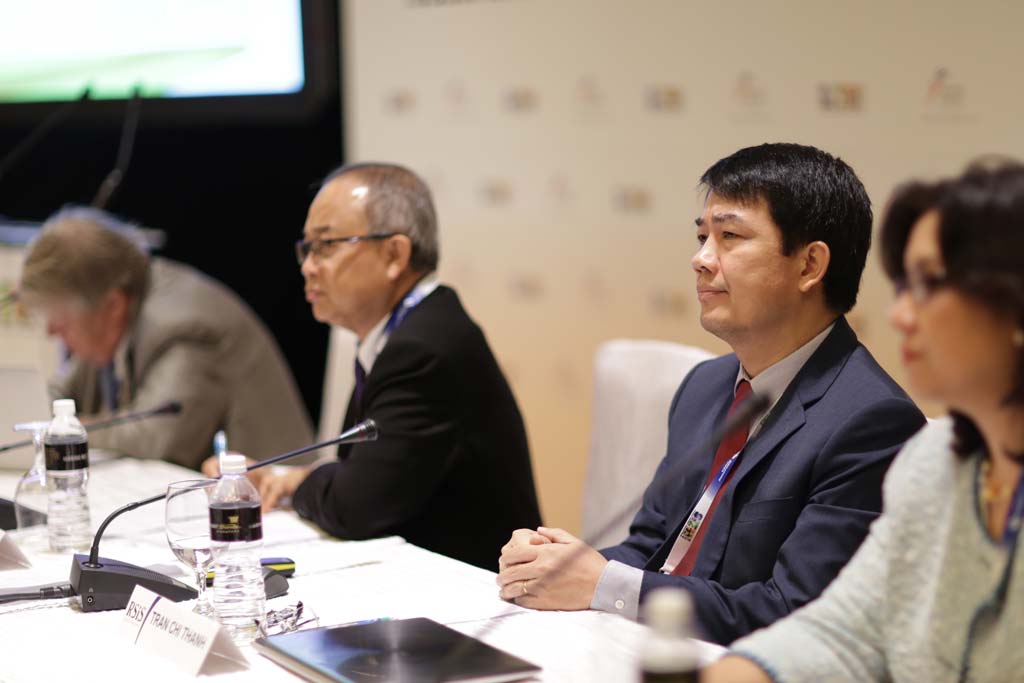
Panelists listen to audience questions at the “Is Southeast Asia Ready for Nuclear Power?” Roundtable hosted by the S. Rajaratnam School of International Studies (RSIS)
By Lionel Choo
Skills and expertise development, public acceptance and political commitment remain key challenges to the adoption of nuclear power in Southeast Asia, panellists said on Thursday at Singapore International Energy Week 2015.
Of the 70 nuclear power plants now under construction around the world, 41 are in Asia – the majority in China and India. In Southeast Asia, countries such as Vietnam, Indonesia, Malaysia and Thailand have plans to develop nuclear energy but have yet to start building.
Vietnam’s plans are the most concrete, although the timeline for its first nuclear plant has been delayed to 2026 or later. Construction is expected to start only in 2019 and take at least six years.
“The largest challenge now is human resources,” Dr Tran Chi Thanh, president of the Vietnam Atomic Energy Institute, said at the roundtable on the readiness of Southeast Asian countries for nuclear power.
Vietnam lacks nuclear specialists and experts, especially in engineering, and utilities do not have experience working on nuclear power projects, Thanh said. To develop capabilities and attract talent, the government has set up the Nuclear Energy Specialist Training programme and a national scholarship, followed by overseas attachments for further training and study.
Public acceptance is another challenge. A survey in November 2014 showed that 72% of Indonesians were in favour of nuclear energy but that acceptance of people near potential reactor sites was only about 50%.
Another factor is political support. Dr Taswanda Taryo, deputy chairman of Indonesia’s National Nuclear Energy Agency, said “a long-term commitment from top management” is needed for nuclear power projects.
Representatives of non-governmental organisations also discussed the issues of nuclear power plant safety, permanent waste disposal options and the role of the scientific community, which are all important in the considerations of adopting nuclear power.
Professor Andrew Wee, provost’s chair professor of physics at the National University of Singapore and president of the Singapore National Academy of Sciences, said the scientific community could play a larger role and act as an independent voice on nuclear energy, fostering greater cooperation between regional countries and between policymakers and stakeholders.
About Singapore International Energy Week (SIEW)
In its 8th edition, Singapore International Energy Week is the premier platform in Asia for energy insights, partnerships and dialogue, bringing together the world’s leading conferences, exhibitions and roundtables in one week and one location. SIEW enriches the global energy conversation by convening political, business, academic and energy industry thought-leaders to define and advance the world’s energy challenges, solutions and actions across the spectrum of oil and gas, clean and renewable energy, and energy infrastructure financing.
Please visit www.siew.gov.sg for more information.
About the Energy Market Authority
The Energy Market Authority (EMA) is a statutory board under Singapore’s Ministry of Trade and Industry. Our main goals are to ensure a reliable and secure energy supply, promote effective competition in the energy market and develop a dynamic energy sector in Singapore. Through our work, we seek to forge a progressive energy landscape for sustained growth.
Please visit www.ema.gov.sg for more information.